The Timeline of a Criminal Background Check: Key Factors and Legal Insights
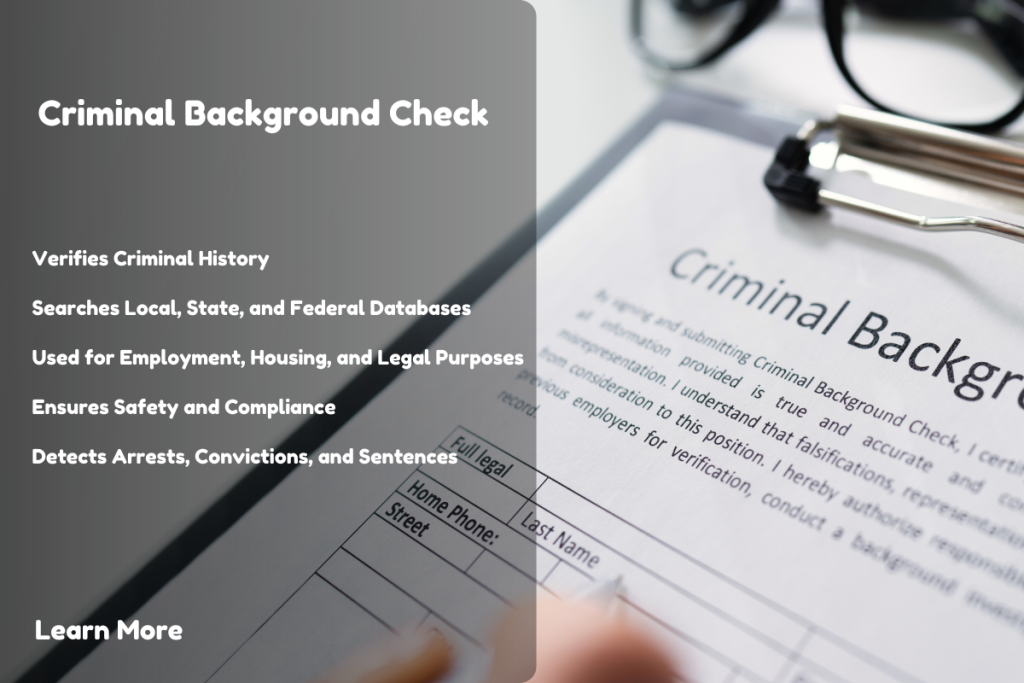
Understanding Criminal Background Checks
A criminal background check is a process through which an individual’s criminal history is examined to assess their suitability for various activities such as employment, renting, or obtaining security clearances and criminal background Checks. These checks typically include a review of an individual’s criminal records, which can encompass federal and state records, arrest records, convictions, and sometimes, sexual offender registries.
What Do Criminal Background Checks Include?
Criminal background checks vary based on the depth of the search and the type of background check requested. Here are the most common components included:
- Federal and State Records: These checks include nationwide criminal databases or state-specific records to reveal any past criminal activities, including arrests, convictions, and pending cases.
- Arrest Records: Arrests are often included in a criminal background check but do not automatically imply guilt or a conviction. They simply indicate whether the individual was involved in any criminal activity.
- Conviction Records: These records provide a detailed account of crimes the individual has been convicted of, including the nature of the crime, sentencing, and rehabilitation.
- Sex Offender Registries: Many background checks, especially for jobs involving vulnerable populations, may include a search of sex offender registries at both the state and national levels.
- County and Local Records: Some checks also include county-specific or local records, which may provide further information on minor offenses or recent activities not captured by state or federal records.
Why Are Criminal Background Checks Conducted?
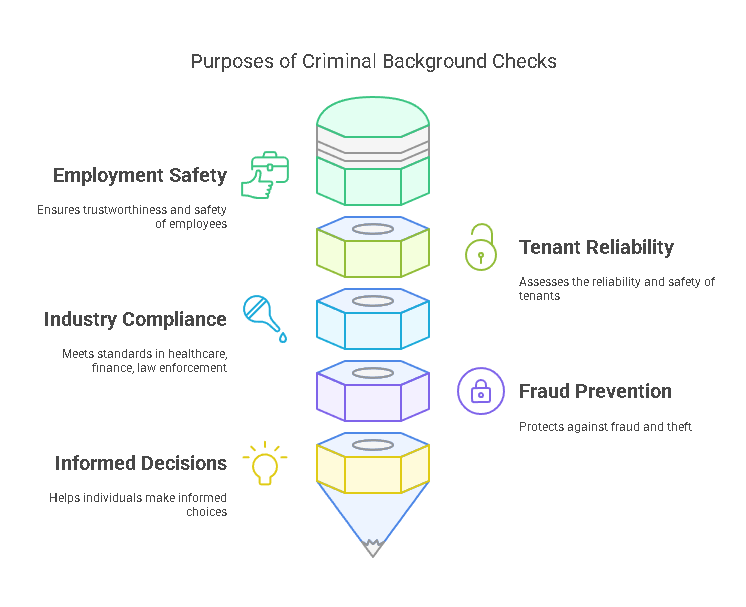
Criminal background checks are vital tools for individuals and businesses alike. Employers often use them as part of the hiring process to ensure the safety and trustworthiness of new employees. Similarly, landlords may conduct criminal checks to assess the reliability and safety of potential tenants. Certain jobs, such as those in healthcare, finance, or law enforcement, also require these checks as part of the hiring or licensing process to ensure compliance with industry standards.
In addition to protecting companies and organizations from fraud, theft, or unsafe behavior, criminal background checks also help individuals make informed decisions. Whether applying for a job, renting an apartment, or seeking a license, knowing an individual’s criminal history can prevent potential risks to personal and public safety.
Types of Criminal Background Checks
There are different types of criminal background checks, each serving different needs:
- National Criminal Background Checks: These provide a broad overview of an individual’s criminal history across the country and are usually conducted via databases that aggregate records from multiple states.
- State Criminal Background Checks: These are limited to a specific state and are essential for employers or organizations operating within that state.
- County-Level Checks: County checks are more localized and can reveal specific offenses that may not appear in broader national or state searches. These are often used in combination with state and federal checks to get a more complete picture of an individual’s criminal history.
- FBI Criminal Background Check: This comprehensive check pulls data from federal databases and is often required for government positions or jobs that require extensive security clearances.
Why Does the Duration of a Criminal Background Check Vary?
The time it takes to complete a criminal background check can vary widely depending on several factors. One of the most significant factors is the type of background check being conducted. For instance, a county-level check may take less time than a national or federal check due to the volume of data that needs to be processed. Similarly, the agency conducting the check can influence the speed, with some third-party providers offering faster services than government agencies.
Other factors that can affect the timing include the complexity of the check, such as whether the individual has a history across multiple jurisdictions or states, and the completeness of the information provided by the person undergoing the background check. Missing details like full names, previous addresses, or other identifiers can delay the process, as the agency may need to gather additional information.
Common Uses of Criminal Background Checks
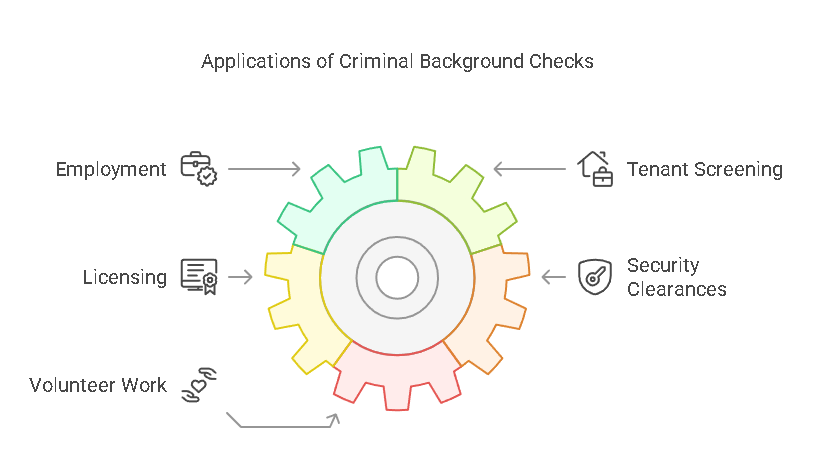
Criminal background checks are used in several scenarios, especially in areas that require trust and security. Here are some of the most common uses:
- Employment: Employers conduct criminal background checks as part of their hiring process to ensure a safe and trustworthy workplace.
- Tenant Screening: Landlords often require a criminal background check to assess the risk of renting to a potential tenant.
- Licensing: Many professional licenses, such as for healthcare workers, financial advisors, and teachers, require background checks to ensure the applicant meets the legal and ethical standards of the industry.
- Security Clearances: For jobs involving access to sensitive information, such as government or military positions, an in-depth criminal background check is essential to ensure the individual can be trusted with security-sensitive roles.
- Volunteer Work: Organizations working with children, elderly people, or other vulnerable populations often require volunteers to undergo criminal background checks to ensure safety.
How Long Does a Criminal Background Check Take?
The time it takes to complete a criminal background check depends on several factors, ranging from the type of check requested to the agency performing the check. In this section, we’ll break down the factors affecting the duration of a criminal background check, typical time frames, and common reasons for delays.
Factors Affecting the Duration of a Criminal Background Check
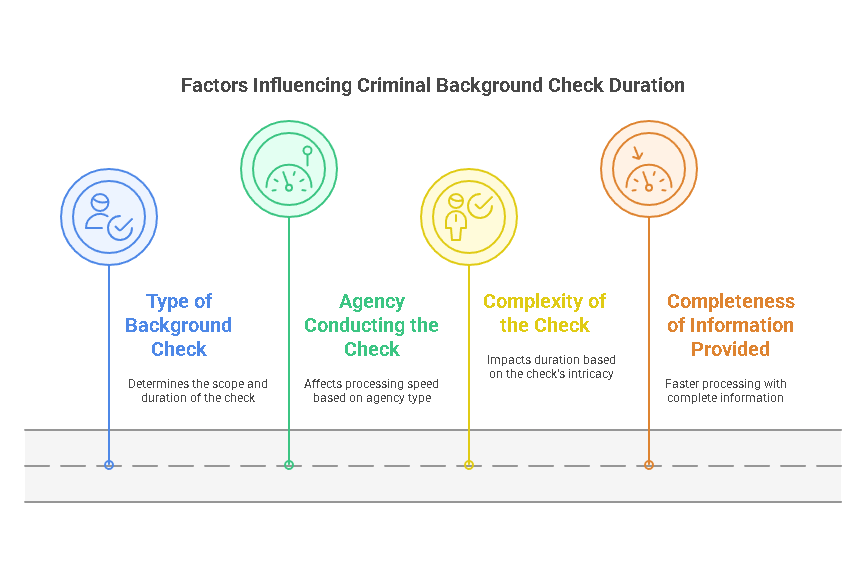
- Type of Background Check
The duration of a criminal background check varies based on its scope. The more comprehensive the check, the longer it typically takes.- Local vs. National Checks: A county or local background check usually takes less time since the search is limited to a specific jurisdiction. These checks can be completed in a few hours to a few days, depending on how quickly local agencies respond.
- State vs. Federal Checks: State and federal checks are more comprehensive and can take longer. State checks can take several days to a week, while federal checks, especially those involving an FBI fingerprint check, may take anywhere from 1-3 weeks. Federal background checks are often required for roles with high security clearance and involve more detailed investigations.
- Agency Conducting the Check
The agency conducting the criminal background check can also influence the processing time. Government agencies tend to be slower due to bureaucracy and administrative processes. In contrast, third-party agencies that specialize in background checks may complete the process faster, typically within 1-3 business days. - Complexity of the Check
A simple criminal background check that only looks for recent or minor offenses will usually be completed faster than one that requires a detailed search of multiple jurisdictions or international databases. Complex checks may also be required when an individual has lived in several states or countries, which can delay the process as each jurisdiction has its own procedures and timelines. - Completeness of Information Provided
The more information provided upfront by the individual undergoing the background check, the faster the process can be. Missing details such as maiden names, previous addresses, or birthdates can lead to delays as the agency may need to gather additional information to complete the check.
Typical Time Frames for Criminal Background Checks
Here’s an overview of typical time frames for various types of criminal background checks:
| Type of Background Check | Time Frame |
|---|---|
| County-Level Check | A few hours to a few days |
| State-Level Check | A few days to 1 week |
| National Background Check | 1 to 3 days |
| FBI Fingerprint Check | 1 to 3 weeks (depending on processing time) |
| International Check | 1 to 4 weeks (depending on countries involved) |
Common Reasons for Delays
While background checks can usually be completed in a few days or weeks, there are several reasons why they might take longer than expected:
- Discrepancies in Information: If there are discrepancies or missing information in the background check application, the agency may need to conduct a more in-depth investigation to verify the details.
- Outdated Records: In some cases, criminal records may not have been updated in the agency’s database, causing delays. Some records may also be archived and require more time to retrieve.
- Multiple Jurisdictions: When an individual has lived in multiple states or countries, the background check may need to span several jurisdictions, each of which may have different response times.
- Lack of Cooperation from Jurisdictions: Some jurisdictions may take longer to respond to background check requests due to backlogs or delays in their internal processes.
The Role of Precisehire in Streamlining Criminal Background Checks
Precisehire is a background screening company that helps businesses streamline the background check process, reducing the time and effort involved in obtaining criminal records. By leveraging advanced technology and partnerships with local, state, and federal authorities, Precisehire can help companies ensure compliance with relevant laws and regulations while reducing delays.
Precisehire offers a comprehensive suite of services, including employment verification, criminal background checks, and identity verification. With an efficient process that automates much of the work, Precisehire helps businesses get timely and accurate results. They also ensure that the background checks are in compliance with both federal and state laws, helping companies mitigate risk and make informed decisions about hiring and employee management.
Legal Aspects of Criminal Background Checks
Criminal background checks are governed by a combination of federal and state laws, which aim to protect both the individuals undergoing the checks and the businesses or organizations conducting them. In this section, we’ll discuss key legal considerations that affect the timing and usage of criminal background checks, as well as common FAQs related to the duration of these checks.
Fair Credit Reporting Act (FCRA) and Criminal Background Checks
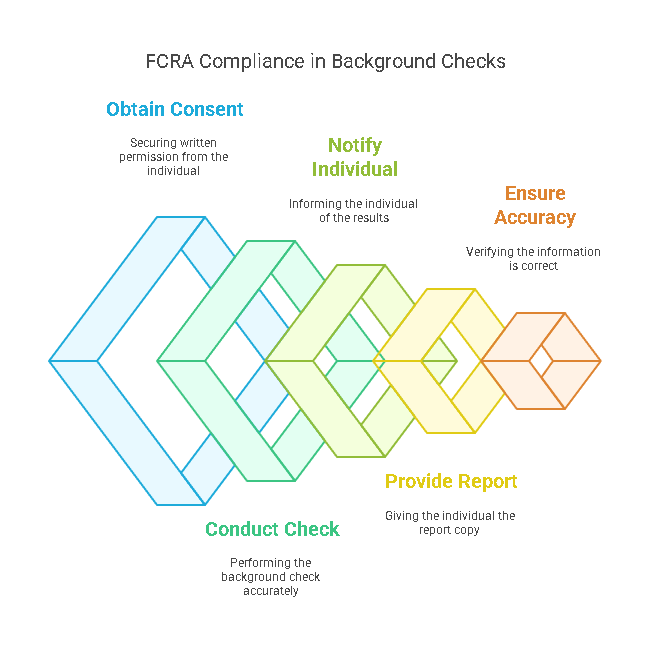
The Fair Credit Reporting Act (FCRA) is a federal law that regulates the use of consumer information, including criminal records, for employment purposes. The FCRA requires that background checks be conducted in a fair and transparent manner. Some of the key implications for criminal background checks include:
- Consent: Employers must obtain written consent from the individual before conducting a background check.
- Notification: If a negative decision is made based on the background check (such as rejecting a job applicant), the employer must notify the individual and provide them with a copy of the report, along with information about how to dispute inaccuracies.
- Accuracy: Employers must ensure the background check results are accurate and up-to-date, adhering to the guidelines set forth by the FCRA.
In terms of timing, the FCRA does not impose a specific timeline for how long a background check should take, but it does require that the check be completed in a timely and accurate manner.
Equal Employment Opportunity Commission (EEOC) Guidelines
The Equal Employment Opportunity Commission (EEOC) provides guidelines on how background checks should be used during hiring processes. The EEOC enforces laws prohibiting discrimination based on race, color, religion, sex, national origin, disability, and age. Under the EEOC guidelines:
- Criminal Records and Hiring: Employers are prohibited from using criminal background checks to discriminate against applicants based on protected characteristics.
- Consistency: Employers must apply their background check policies consistently to all applicants and avoid making decisions based on arrest records, as arrests alone do not necessarily indicate criminal conduct.
These guidelines ensure that employers use background checks fairly and responsibly, preventing discriminatory practices based on criminal history.
State Laws Impacting Background Check Duration
While the FCRA provides federal guidelines, individual states may have their own laws that govern criminal background checks. For example:
- Ban the Box: Some states have “ban the box” laws, which prevent employers from asking about an applicant’s criminal history on job applications. These laws are meant to give individuals a fair chance before employers consider their criminal background.
- Time Limits: Certain states may have laws that limit how far back an employer can look into a person’s criminal history. For instance, many states restrict employers from using criminal records that are older than 7-10 years.
- Expungement: Some states allow individuals to expunge certain criminal records. Employers in these states must be careful not to use expunged records in their decision-making process.
Understanding these state laws is crucial for employers to ensure that their background check processes comply with both state and federal regulations.
Frequently Asked Questions About Criminal Background Checks and Their Duration
What is the fastest way to get a criminal background check?
The fastest way to obtain a criminal background check is to use an online service that connects directly to databases or uses local county court records. Many third-party services, like Precisehire, can deliver results within a few hours to a few days, depending on the type of check.
Can I speed up my background check process?
While you cannot directly influence how fast an agency processes a background check, you can help speed things up by providing complete and accurate information. Ensure that all necessary details, such as previous addresses and full legal names, are included when submitting the request.
Why does it take so long for a criminal background check?
Delays in background checks can happen for various reasons, including the need to review multiple jurisdictions, outdated records, or discrepancies in the information provided. Additionally, checks that involve federal agencies or international records can take longer due to the complexity and scope of the search.
Can I track the progress of my background check?
Some background check services, including Precisehire, allow clients to track the progress of their criminal background check online. This feature provides transparency and allows employers to monitor when the check will be completed.
How does the state of residence affect the time for a criminal background check?
The state of residence can affect the duration of the background check due to differences in how quickly state agencies respond to requests. Some states may have a faster turnaround time for criminal history searches, while others may take longer due to the volume of requests or administrative delays.
Conclusion
Criminal background checks are an essential part of hiring processes, tenant screenings, and security clearances, but the time it takes to complete these checks can vary widely. Factors such as the type of check, the agency conducting the search, the complexity of the information, and even the state laws involved can all impact the duration.
Employers and individuals should plan accordingly, understanding that a background check can take anywhere from a few hours to several weeks, depending on the circumstances. For businesses looking to streamline the background check process, partnering with a reliable service like Precisehire can help ensure quick, accurate, and legally compliant results.
By following best practices and understanding the factors affecting the background check process, companies can make informed decisions while protecting themselves from potential legal challenges.
